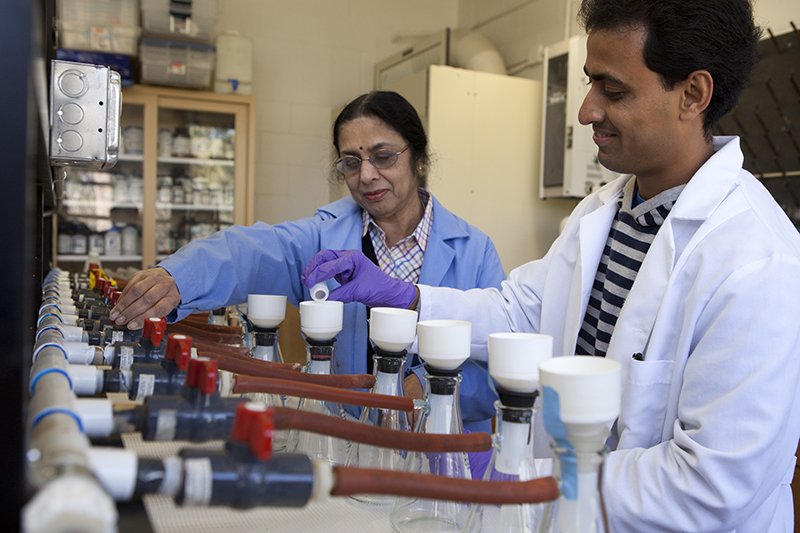Samantha Murray, Public Relations Specialist, UF/IFAS Communications
In the time of COVID-19, plants still get sick, and the soil that nourishes them needs care. The health of plants and soil is critical to agriculture, an industry designated an essential service in response to the pandemic.
That’s why today, when many American universities have transitioned to online-only and their employees adapt to working from home, scientists at University of Florida/IFAS laboratories on the main Gainesville campus and elsewhere across the state are working with limited staffing and hours to test samples of soil, water, plants, and even manure sent in from across the state and beyond.

Graduate students and faculty working at the Soil and Water Sciences laboratory. Credit: Tyler Jones, UF/IFAS
With the growing concerns about how COVID-19 will affect jobs and the economy, making informed business decisions is more important than ever. UF/IFAS diagnostic labs provide that vital information, one sample at a time. The following labs are receiving and processing shipped samples:
Main UF Campus
- Extension Soil Testing Laboratory
- Insect Identification Laboratory
- Nematode Assay Laboratory
- Plant Diagnostic Center
–
Together, these labs receive thousands of samples each year. Samples are submitted by people who need answers about diseased plants, soil or plant nutrient deficiencies and other agricultural concerns.
“The work done in these labs is critical to the success of Florida’s agricultural industries, from plant nurseries to citrus growers, to home landscapers to cattle ranchers. That’s because results from these labs help people make informed decisions that impact their businesses,” said Saqib Mukhtar, associate dean of agriculture for UF/IFAS Extension.
For example, if a plant isn’t infected with a fungus, that knowledge can prevent a farmer from applying fungicide chemicals unnecessarily, saving money. Or, if soil is lacking nutrients, applying the proper enhancements in the right amounts can ensure nutritious grass for cattle.
“Typically, the soil testing lab processes about 16,000 to 18,000 samples a year from all counties in the state, covering nearly 100 commodities, as well as home landscapes and grasses for livestock,” said Rao Mylavarapu, director of the UF/IFAS Analytical Services Laboratories, of which the soil testing lab is a part.
If someone wants to know if their plants are sick, they can send samples to the Plant Diagnostic Center in Gainesville or the clinics in Quincy or Homestead. The Plant Diagnostic Center is directed by Carrie Harmon, an Extension specialist in the department of plant pathology.
“All plant industries in Florida and beyond use our services,” Harmon said. “This week, we have received samples of tomato, potato, pepper, turf, several different woody and herbaceous ornamentals, palms and more. We receive about 3,300 samples a year, plus an additional 3,700 emergency survey samples from the USDA Animal and Plant Health Inspection Service.”
Right now, staff at the Plant Diagnostic Center are working in shifts, with no more than one person in the building at a time, Harmon said. They are triaging samples, culturing fungi and bacteria, running tests, and responding to client emails and phone calls.
“Additionally, we are doing as much digital diagnosis as we can, to save folks from having to send in a sample if possible – saves them from shipping costs and reduces the load on the lab,” she said.
For the time being, even as stores shutter and students head home, both on-campus labs will continue receiving samples by mail.
“We are here for Florida agriculture. They don’t stop, so we won’t either, as long as possible,” Harmon said.
To learn how to submit samples or contact a lab or clinic, visit https://diagnostics.ifas.ufl.edu/.
